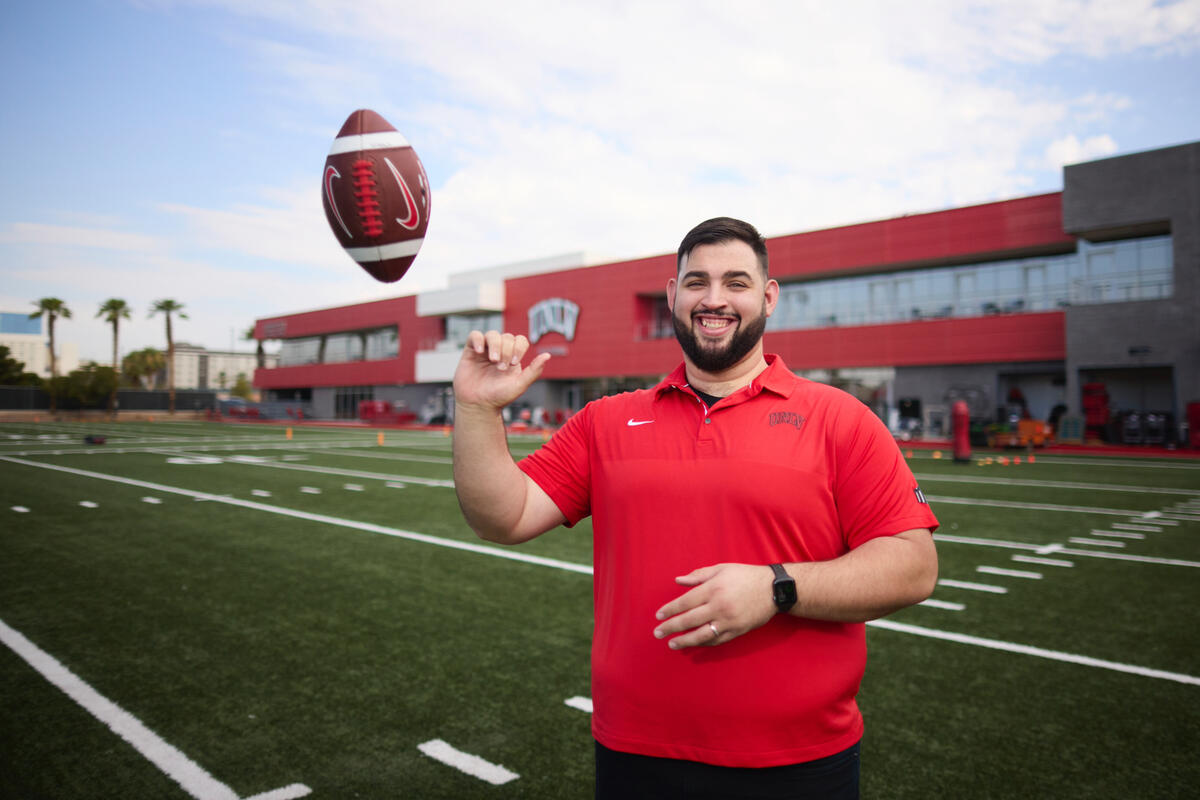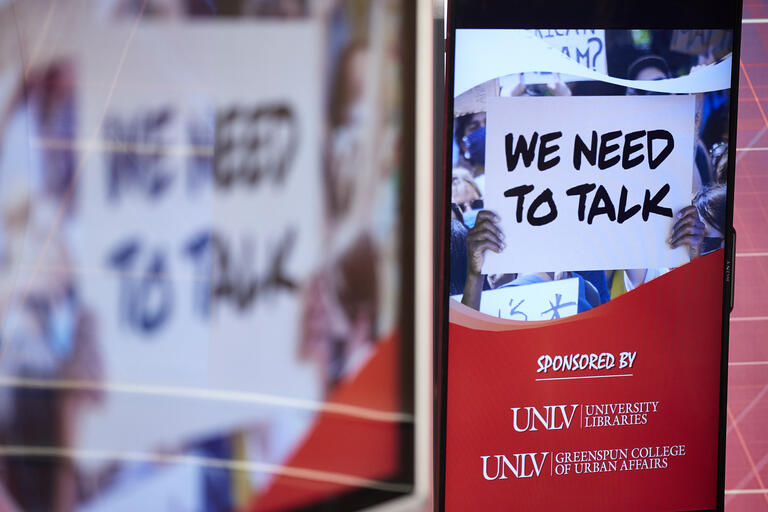“Hard work beats talent when talent doesn't work hard."
For double UNLV alumnus Ammir Aziz, these words have shaped his life. At the age of 12, Aziz moved to Las Vegas from Brooklyn, New York, with his mom, dad, and brother. He had no idea that in just three years, he would find himself homeless and alone, fending for himself.
After a house fire devastated his family, Aziz was given the choice to return to New York with his dad and brother or stay in Las Vegas and find his own way. He chose to stay.
“I was 15 years old. And I knew from all the values my mom instilled in me as a kid that my education was important, so I stayed in school,” said Aziz.
Despite the odds seemingly being against him, he persevered. He slept on the football field at his high school and showered in the nurse's office. When asked why he never gave up, Aziz simply replied that he didn’t know how.
Aziz graduated from high school in 2014, and enrolled in UNLV. In the spring of 2015, he began playing for the UNLV football team as a walk-on. In addition to earning his Bachelor in Social Work in 2018, Aziz completed his master's degree in intercollegiate and professional sport management from UNLV last May.
Now, as the regional project manager for the nonprofit The Defensive Line, Aziz is motivated by his own experiences to tackle suicide prevention among young people of color.
According to the Centers for Disease Control and Prevention, in 2021, suicide was among the top 9 leading causes of death for people ages 10-64. Suicide was the second leading cause of death for people ages 10-14 and 20-34. To address this issue locally, the UNLV School of Public Health has partnered with The Defensive Line to give educators the tools to know what to do next once they are aware of a student at risk of suicidal ideation. The Defensive Line was co-founded by former Las Vegas Raider Solomon Thomas and his parents, Martha and Chris Thomas, after his sister, Ella, died by suicide.
When you were homeless in high school, what turned things around for you?
One night I had a sleepover at a teammate's house. All I wanted was a clean bed to sleep in and a chance to regather my thoughts, but I was in store for something that would change my life forever. My teammate's dad saw the kind of struggle I was in, and he said, "Hey, I'm sorry you're going through this, and I really wish there was more I could do, but I have two kids and I just can't afford a third one right now. You can stay for two weeks, but then you're going to have to figure out what to do next." Two weeks turned into two years turned into six years. He adopted me when I was 17, and I still talk to him every week. I was given two brothers and a dad who are always there for me.
What role has playing football played in your life?
I started at UNLV in the fall of 2014, then I walked on to the UNLV football team in the spring of 2015. The Tony Sanchez era was in full effect! I'll forever be thankful for my time at UNLV, with all the love and support I got from my coaches and teammates. Being a walk-on wasn't always the easiest thing, but working two jobs to put myself through college was all worth it.
Tell us about a pivotal moment that changed your life.
One day after practice, our coaches brought in a little treat for the team to celebrate the last practice of the season. Little did I know it was going to change my life. The coaches brought in a magician from Bally’s to perform for us, and at the end, he asked for a volunteer. He unbuttoned his shirt, and to my surprise, I saw an envelope with my name on it. I opened it, and the whole team erupted with cheers! The paper inside congratulated me on receiving a full-ride scholarship. (Watch the video.)
What experience has influenced your job with The Defensive Line?
It was just another Thursday in the middle of summer football practices until we got some heartbreaking news. One of my old teammates had died by suicide, and I honestly didn't know how to respond. A guy who was the nicest guy off the field, always smiling and laughing, and one of the first people to really welcome me to the team wasn't with us anymore.
[In the past] football coaches focused on mental toughness. But I think this new era of coaches and teachers separates being mentally tough from also accepting mental vulnerability.
How is The Defensive Line making a difference in the Southern Nevada community?
We provide workshops to educators, parents, coaches, and supporting staff, giving them the proper tools to notice the signs of suicidal tendencies and how to make a plan of action on what to do next. We have been working with the UNLV College of Education to train students before they become teachers. These are the trusted adults who often see things in young people before anyone else. We believe that by giving them the knowledge and guidance of what to do next, we can make a difference in the lives of many students.
It’s hard to measure something that doesn’t happen. How does The Defensive Line measure success?
You’re right. We measure our success by the impact and feedback from those who go through our training. Our ultimate goal is to see a decline in the suicide rate, especially among young people, in Nevada.
What motivates you to get out of bed and go to work every day?
My biggest motivation is my two sons. I want to leave the world in a better place than I found it. I grew up with several restrictions when it came to talking about feelings and mental health, just from the cultural norms learned from my mother and father. I want to do my part and help make their lives better, as any parent would want.
Is this the work you thought you would be doing when you were a little kid?
I kind of always knew I wanted to help children. In high school, I had Miss Laurie, who was kind of the school's social worker before the school had a real one. She helped me graduate, she fed me, she clothed me, and she gave me the hope I needed to see the light at the end of the tunnel. I hope to pay the kindness of others forward in the work I get to do through The Defensive Line.
How can the community get involved with The Defensive Line?
The best way to get involved is really to understand that death by suicide is a real problem here in Nevada. Anyone can help make a difference. Whether it's reaching out to set up a workshop, donating to the cause, or even just talking about suicide or mental health with your kids – everything helps.
If you are interested in scheduling a suicide prevention workshop with The Defensive Line or donating to the organization, contact Ammir Aziz at ammir.aziz@unlv.edu. If you or your child is in crisis, contact the 988 Suicide and Crisis Lifeline by calling or texting 988.



